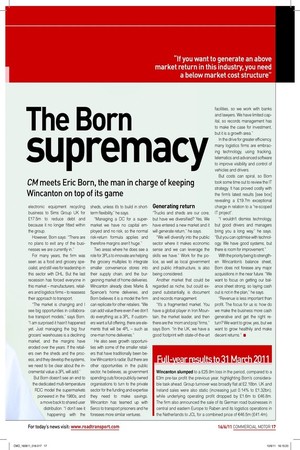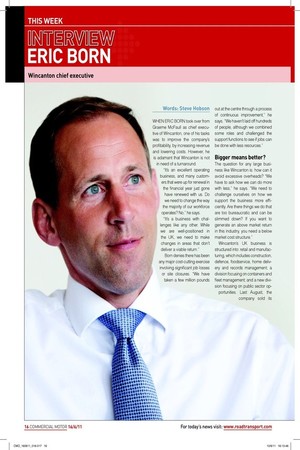The Born
Page 15

Page 14

If you've noticed an error in this article please click here to report it so we can fix it.
supremacy
CM meets Eric Born, the man in charge of keeping Wincanton on top of its game Words: Steve Hobson
WHEN ERIC BORN took over from Graeme McFaull as chief executive of Wincanton, one of his tasks was to improve the company’s profitability, by increasing revenue and lowering costs. However, he is adamant that Wincanton is not in need of a turnaround.
“It’s an excellent operating business, and many customers that were up for renewal in the financial year just gone have renewed with us. Do we need to change the way the majority of our workforce operates? No,” he says.
“It’s a business with challenges like any other. While we are well-positioned in the UK, we need to make changes in areas that don’t deliver a viable return.” Born denies there has been any major cost-cutting exercise involving significant job losses or site closures. “We have taken a few million pounds out at the centre through a process of continuous improvement,” he says. “We haven’t laid off hundreds of people, although we combined some roles and challenged the support functions to see if jobs can be done with less resources.”
Bigger means better?
The question for any large business like Wincanton is: how can it avoid excessive overheads? “We have to ask how we can do more with less,” he says. “We need to challenge ourselves on how we support the business more efficiently. Are there things we do that are too bureaucratic and can be slimmed down? If you want to generate an above market return in this industry, you need a below market cost structure.” Wincanton’s UK business is structured into: retail and manufacturing, which includes construction, defence, foodservice, home delivery and records management; a division focusing on containers and fleet management; and a new division focusing on public sector op portunities. Last August, the company sold its electronic equipment recycling business to Sims Group UK for £17.5m to reduce debt and because it no longer fitted within the group.
However, Born says: “There are no plans to exit any of the businesses we are currently in.” For many years, the firm was seen as a food and grocery specialist, and still vies for leadership in this sector with DHL. But the last recession has forced everyone in this market – manufacturers, retailers and logistics firms – to reassess their approach to transport.
“The market is changing and I see big opportunities in collaborative transport models,” says Born. “I am surprised it hasn’t happened yet. Just managing the big four grocers’ warehouses is a declining market, and the margins have eroded over the years. If the retailers own the sheds and the process, and they develop the systems, we need to be clear about the incremental value a 3PL will add.” But Born doesn’t see an end to the dedicated multi-temperature RDC model the supermarkets pioneered in the 1980s, and a move back to shared user distribution. “I don’t see it happening with the sheds, unless it’s to build in shortterm flexibility,” he says.
“Managing a DC for a supermarket we have no capital employed and no risk, so the normal risk-return formula applies and therefore margins aren’t huge.” Two areas where he does see a role for 3PLs to innovate are helping the grocery multiples to integrate smaller convenience stores into their supply chain, and the burgeoning market of home deliveries. Wincanton already does Marks & Spencer’s home deliveries, and Born believes it is a model the firm can replicate for other retailers. “We can add value there even if we don’t do everything as a 3PL. If customers want a full offering, there are elements that will be 4PL – such as one-man home deliveries.” He also sees growth opportunities with some of the smaller retailers that have traditionally been below Wincanton’s radar. But there are other opportunities in the public sector, he believes, as government spending cuts force publicly owned organisations to turn to the private sector for the funding and expertise they need to make savings. Wincanton has teamed up with Serco to transport prisoners and he foresees more similar ventures.
Generating return
“Trucks and sheds are our core, but have we diversified? Yes. We have entered a new market and it will generate return,” he says.
“We will diversify into the public sector where it makes economic sense and we can leverage the skills we have.” Work for the police, as well as local government and public infrastructure, is also being considered.
Another market that could be regarded as niche, but could expand substantially, is document and records management.
“It’s a fragmented market. You have a global player in Iron Mountain, the market leader, and then there are the ‘mom and pop’ firms,” says Born. “In the UK, we have a good footprint with state-of-the-art facilities, so we work with banks and lawyers. We have limited capital, so records management has to make the case for investment, but it is a growth area.” In the drive for greater efficiency, many logistics firms are embracing technology, using tracking, telematics and advanced software to improve visibility and control of vehicles and drivers.
But costs can spiral, so Born took some time out to review the IT strategy. It has proved costly with the firm’s latest results [see box] revealing a £19.7m exceptional charge in relation to a “re-scoped IT project”.
“I wouldn’t dismiss technology, but good drivers and managers bring you a long way,” he says. “But you can optimise with technology. We have good systems, but there is room for improvement.” With the priority being to strengthen Wincanton’s balance sheet, Born does not foresee any major acquisitions in the near future. “We want to focus on getting our balance sheet strong, so laying cash out is not in the plan,” he says.
“Revenue is less important than profit. The focus for us is: how do we make the business more cash generative and get the right return? We want to grow, yes, but we want to grow healthily and make decent returns.” ■














































